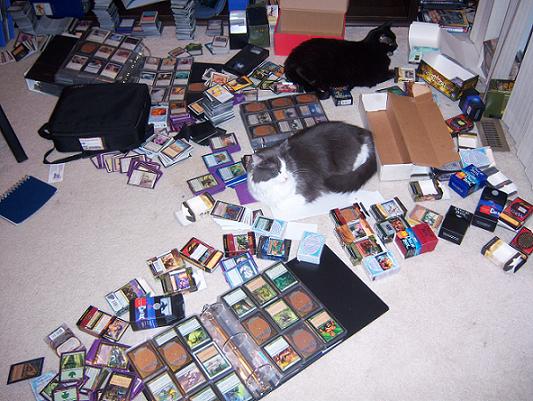
Hello, my name is Lieutenant Meyou and I have been a Card Scene Investigator (CSI) for many years. How the years have made me hard and cold to the crimes committed by the players of our community. I have seen it all. Since you are my new partner, I will debrief you on the various illegal activities of the Magic underground. Some you may know or be familiar with depending on your years of service in the game. However, rules are rules and we will move forward with the semantics of this debriefing.
Loitering and Vandalism
Over the years, one of the smallest crimes I have investigated is the loitering of an unwanted population. The infraction only holds a petty fine and can be difficult to enforce. Most cases could have been prevented by the civilian if the proper safeguards had been utilized. Cards left out carelessly might as well be an open invitation to certain devious citizens. As a Card Scene Investigator, I have found the most common criminals are dogs, cats, kids, and the occasional spouse. Interrogation proves futile as the suspects plead their innocence of not knowing better. An officer at the scene may best serve the collection by educating the victims on how to prevent loitering and vandalism. Safeguards such as card sleeves, binders, and monitoring of the collection can do wonders at protecting a person’s property. The example below is a scenario where the collector had torn through his card collection looking for an elusive set of Rampant Growths. The collector had forgotten the decks they were placed in and succumbed to the agonizing effort of going through the entire collection to find them. We educated him on such dangers by explaining how a niece or nephew could easily gum valuable cards, dogs with a cardboard craving might ingest such savory cardboard, or cats could easily destory a Serra Angel or two with a hairball.

Theft
Only a misdemeanor, but theft represents an increasing problem amongst rival decks. Such crimes can be nonviolent, but can cause serious damage to decks within the collection. Varying degrees of stolen property occur in any given collection. Most notably is the Standard theft. This gives way to some cards that were rotated of Standard are now legal again in the format. Cards such as Harrows who were once the property of the Domain decks. Once legalized, the card becomes a hot commodity for tournaments and will get stolen out of those decks to be used for nightly crimes of at a local FNM. The tragedy is the Domain decks lack the power level they once had before the theft. Wrath of God is no longer Standard legal and will get picked up by lower decks in the collection for some strange white deck to give it a boost.
Cardnapping

Many reasons can be for the motivation behind napping of cards. The problem is predominant in poorer collections. Power cards often get napped from deck to deck to give beginning players an edge against the competition. In one case, Demonic Tutor was originally napped from a mono black deck for the goal of being placed in a combo deck. Often times, cards such as these will then get bounced from deck to deck for some years. Combating the crimes can be difficult. It is a societal issue. Cardnappings happen less frequently in wealthier collections while cancerous in smaller collections. The best ways to deal with the systemic problem is to help grow the collections and giving those collectors the resources/programs they need to build the proper decks. One of the reasons why, as an investigator, I believe such resources and programs are vital at helping these poor individuals. None of these would be possible if it was not for the kind donations received by the elite of our community.
As with many, some of these crimes are simply out of need. A person with only 3 Terrors as the only source of black removal will be more tempted to be napped for every other black deck or decks with a black splash. Poor cards rarely have a permanent home. Programs such as Cards for Humanity help find cards a stabile home. Sure, there will always be those players who abuse the kindness of others. However, a donation of Nekrataals can go a long ways into helping the poor players of our community find some stability in their lives.
The Organizations
The majority of card collection crime has been supported financially by illicit card sets. Crimes rings such as Vintage Mafia, The Legacies, Extended Legends, and Standard Pain control the flow of most cards. Members of the Vintage Mafia are the old godfathers of the criminal world. The organization has lost numbers over the years, but this loss doesn’t mean the family has garnished any power. Besides taking out an occasional noob, the family gets most of its power through the rough mox and lotus trade. Mafia members rarely shake down a FNM anymore. Many a card investigator would kill for the chance get a crack at their tech to bring the suckers down.
The Legacies have been a growing contingent the last five years. Ever growing in their presence, success of the group is that they don’t compete against the Mafia for cards. This gives them a niche at the Black Lotus market. The group supports itself in card trafficking. Commons victims of the trade are Tarmagoyfs, Phyrexian Dreadnoughts, and Arcbound Ravagers. Some have fallen out of favor for the more sexy Progenitus. Card pimps can make a good profit by having them pull tricks with the degenerate of society such as Stifles and Natural Orders. The very thought makes me sick to my stomach.
Newer and more juvenile gangs are the Standard Pains and Extended Legends. Most crimes are petty. Degenerates of the bunch still represent a significant figure in the underground. Their numbers are larger and various syndicates have recruited a extensive number of members over the years. If these groups go unchecked, prices for their services can become astounding. Infiltrating the groups can be difficult especially with all the street names for sets and decks. Some street names include tog, ravager, tokens, swans, and shards. Not every straight-laced investigator can infiltrate the groups without knowing the lingo.
Illicit Card Sets
As a Card Scene Investigator, just when I thought I cracked the evil game, a flow of new sets provides fresh fuel for the organizations. The hip nature and cool factor of any newly introduced set is hard to combat. Counter Ads such as the Just Say No program has only had a minimal effect. Kids go off to college and can quickly fall into the wrong crowd. Often hanging out at the local scene. Sure, they think nothing of it at first when they first play with gateway products such as the core set. Before they know it, these kids are hooked on hardcore expansions.
Many players fail to think how card sets affect their collections and decks. With the new use, players tend to neglect their starter decks. Other impacts include the disruption to their collection and disorder it brings to everyday deck construction. Fortunately, binders, collector sleeves and deck boxes are available to bring some sense of order to their lives. With proper organization and maintenance, a player can be recuperated.

Just Say
No To
Bad Collecting
Neglect
The most common of all offenses. At any given time, hundreds to thousands of any given card goes neglected. Often, valuable and usable cards go untouched in a person’s collection. Instead of being played with and nurtured to their fullest potential, those cards wither away. When necessary, Card Scene Investigators will intervene with the parents of the neglected cards. The scenario can be very emotional for all individuals. Parents of the cards still have an emotional attachment even with though they are in the wrong. Most cards are forced away from the individuals to find a proper home were those cards can be nurtured to the fullest potential. Sometimes temporary homes are found until a more permanent residence can be discovered. Counseling is presented to the parents to encourage reunions if applicable. If worse comes to worse, we force a trade. Something both parties can be happy with in the long run while still keeping in mind the best interests of the cards.
Intervention
At the CSI, we encourage family and friends to get involved whenever possible. Most players often don’t recognize their crimes of netdecking, napping, and neglect. If families do want to get involved, we encourage they help by building decks and sorting a player’s collection to get them on the right track. Trades should be presented whenever possible. The swapping of cards allows for complete deck lists and the ability to construct the proper decks. Sometimes, alternative formats can be introduced when necessary to fully utilze the breadth of a collection. Cards deemed useless in one format can be quite potent in another. Otherwise, singletons will go unused. In the end, the CSI can only do so much. We can only investigate the aftermath of a crime. It is our hope someday that we will never have to get called to a scene.
Comments